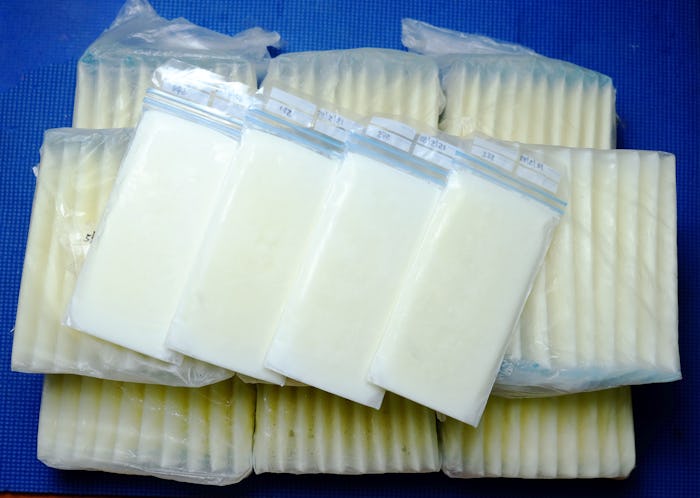Life

If You Have Expired Breast Milk On Hand, Here's A Beneficial Way To Use It
No one says pumping your breast milk will be easy. So if you're a mom who pumps, you want your baby to drink every last drop of the "liquid gold" you worked so hard to provide. Unfortunately, life doesn't always work out that way. From milk that reaches its drink-by date before baby can consume it to the unfinished bottle that can't be reused, or the bag of breast milk accidentally left out all night, every pumping mom has to deal with expired milk now and then. But can you use expired breast milk in a milk bath? This is just one of several ways to get creative in repurposing breast milk that is undrinkable, but not yet rancid or moldy. According to natural parenting blog Mama Hippie, expired breast milk can also be frozen to use later on cuts or made into soap and jewelry.
Over the phone, Cathy La Torre of Holactic Health, a lactation consultant for more than 18 years with a PhD in Natural Health, tells Romper that she thinks using expired milk in a bath "can't hurt" as long as it doesn't smell bad. In addition to diluting it with water, La Torre suggests mixing breast milk with oatmeal for a bath to soothe itchy skin. Breast milk has a lot of amazing properties, says La Torre, so it makes sense to use it for antibacterial and healing purposes. If you want to try a breast milk bath at home, Mother Rising has a helpful step-by-step list of instructions with pictures.
Besides baths, La Torre tells Romper that breast milk can be rubbed on a child's wound to fight infection. You can also apply it to blemishes, pink eye, and cracked nipples. La Torre offers a tip for ensuring the longevity and freshness of your frozen milk: store it in the very back of your freezer so it isn't susceptible to slight melting and re-freezing when you open your freezer for other reasons.
If pumping and dealing with expired milk has you feeling a little discouraged, it can be helpful to remember the many benefits (beyond skincare) that breastfed babies enjoy. The American Academy of Pediatrics recommends "exclusive breastfeeding for about the first six months of a baby's life, followed by breastfeeding in combination with the introduction of complementary foods until at least 12 months of age, and continuation of breastfeeding for as long as mutually desired by mother and baby." Their recommendation is supported by improved outcomes for breastfed babies such as a reduction in SIDS and future obesity, as well as breast milk's "protective effect against respiratory illnesses, ear infections, gastrointestinal diseases, and allergies including asthma, eczema and atopic dermatitis."
In addition to these compelling benefits, La Torre says that breast milk is good for the immature digestive systems babies are born with. Exclusive consumption of human milk gives babies everything they need and sets up their digestion well with the potential to avoid allergies. Infants also taste different food flavors in their mother's milk (based on what she eats), which could possibly make them more open to trying different kinds of solid food later on.
Many pumping moms ditch the pump once their children start eating solids. The onset of this stage varies by child, but you can start offering purées and other appropriate foods at six months. Talk to your pediatrician about the best fruits or vegetables to start with. Even if you stop pumping, you can continue to breastfeed beyond six months, if you wish to, when you are with your child. La Torre calls extended breastfeeding a "nutritional insurance plan," noting that babies and toddlers who don't want to eat because of illness or other reasons will often still nurse, so you can rest assured that they are getting vitamins, nutrients, and water to stay hydrated.
Check out Romper's new video series, Bearing The Motherload, where disagreeing parents from different sides of an issue sit down with a mediator and talk about how to support (and not judge) each other’s parenting perspectives. New episodes air Mondays on Facebook.